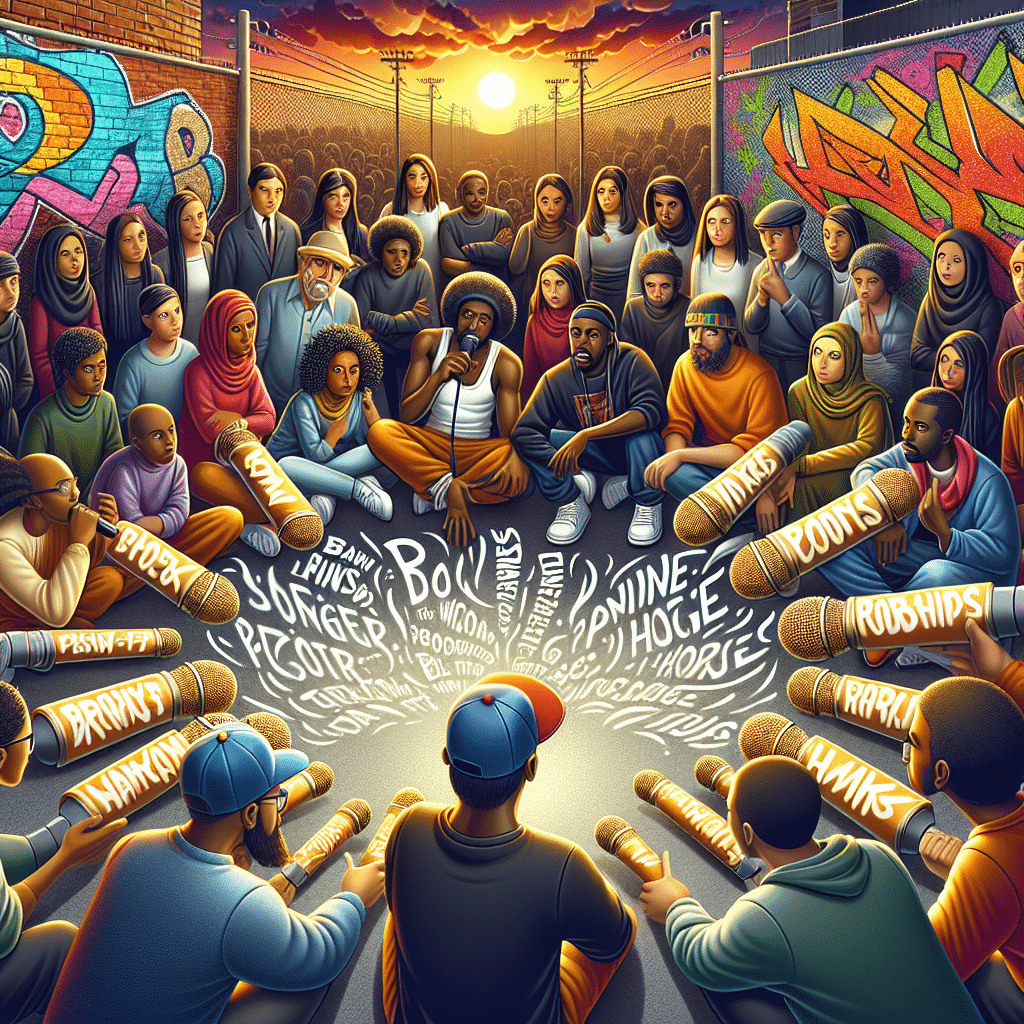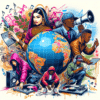Breaking Down Barriers: The Social Commentary in Hip Hop Lyrics

Hip hop has evolved from its humble beginnings in the 1970s, serving as a vibrant platform for artistic expression, cultural identity, and social commentary. Today, it remains an influential genre of music that speaks to the struggles and triumphs of individuals, particularly in disenfranchised communities. As we delve deeper into the significance of social commentary in hip hop lyrics, we will explore its origins, techniques, and the barriers it seeks to break down.
Hip hop emerged as a voice for the voiceless, originating within African American and Latino communities in the South Bronx. Artists like Grandmaster Flash and the Furious Five’s song "The Message" in 1982 exemplified the genre's commitment to social issues. The track highlighted urban poverty, crime, and systemic oppression, encapsulating the struggles of many who felt ignored by mainstream society.
This foundation laid the groundwork for hip hop as a meeting point for political and cultural expression. It evolved from party music into a rich tapestry of stories reflecting societal realities, creating a dialogue around important issues such as racism, inequality, and injustice.
See Also:
 From the Studio to Your Speakers: The Latest in Rap Music
From the Studio to Your Speakers: The Latest in Rap Music1. Storytelling
One of the hallmark techniques in hip hop lyrics is storytelling. Artists employ narratives to share personal experiences or those of their community. For instance, Nas's "Illmatic" is a quintessential example of storytelling that paints vivid pictures of growing up in a rough neighborhood, grappling with crime, and struggling against systemic oppression.
2. Use of Metaphors and Wordplay
Metaphors and clever wordplay serve as powerful tools in hip hop. They allow artists to convey complex ideas succinctly and can resonate with listeners on multiple levels. For instance, Kendrick Lamar's "Alright" utilizes the repeated phrase “We gon’ be alright” as both a personal assurance and a communal rallying cry in the face of racial injustice, effectively turning a personal sentiment into a broader movement.
3. Intertextuality
Many hip hop artists draw from various sources, including literature, historical events, and previous musical works, to deepen their social commentary. The use of intertextuality not only enriches their lyrics but also fosters a connection with listeners who may recognize these references. For example, rappers like J. Cole integrate themes from books and films, creating a layered meaning that often critiques societal norms.
See Also: Hip-Hop's Global Reach: How Local Flavors Are Reshaping the Genre
Hip-Hop's Global Reach: How Local Flavors Are Reshaping the Genre4. Call-and-Response Techniques
Traditional within African American music, call-and-response is a technique that engages listeners directly. In hip hop, this can translate into choruses or hooks that invite participation, fostering unity and collective experience. This engagement turns passive listening into active involvement, reinforcing a sense of community and shared struggle.
Breaking Down Barriers
The Fight Against Racial Inequality
One of the most significant barriers addressed in hip hop lyrics is racial inequality. Artists like Public Enemy and N.W.A. broke new ground in their denunciation of police brutality and systemic racism. Their bold criticisms raised awareness and inspired grassroots movements, making hip hop an important catalyst for conversation around these social issues.
Gender and Sexuality
Hip hop has often been critiqued for its portrayal of women and its largely male-dominated space. However, many female artists, including Queen Latifah and Missy Elliott, have used their lyrics to challenge misogyny and celebrate femininity. They break down barriers by advocating for equal representation and empowerment, reshaping narratives within the genre and encouraging conversations around gender and sexuality.
See Also: Rhyme and Reason: Analyzing the Evolution of Hip Hop Lyricism
Rhyme and Reason: Analyzing the Evolution of Hip Hop LyricismMental Health Awareness
More recently, hip hop has ventured into discussions about mental health. Artists like Kid Cudi and Logic have opened up about their struggles with depression and anxiety, challenging stigmas and encouraging listeners to seek help. By addressing mental health topics, they contribute to breaking down barriers that often discourage open dialogue and healing.
The social commentary found within hip hop lyrics serves multiple purposes: it informs, challenges, and inspires. By addressing issues ranging from racial inequality to mental health, hip hop artists not only share their personal experiences but also give a voice to collective struggles. Their narratives resonate with listeners, sparking conversations that may lead to social change, and reinforcing the genre’s role as an important cultural force.
As hip hop continues to evolve, it is imperative to recognize the profound impact of its social commentary. It provides an avenue for understanding diverse experiences, questioning dominant narratives, and ultimately breaking down barriers that hinder collective progress.
See Also: Beyond the Beat: The Cultural Significance of Hip Hop Lyrics in Today's Society
Beyond the Beat: The Cultural Significance of Hip Hop Lyrics in Today's SocietyFAQs
Q: Why is social commentary important in hip hop?
A: Social commentary allows hip hop artists to address and highlight various social issues, giving voice to marginalized communities and creating space for important conversations.
Q: How does hip hop use storytelling?
A: Storytelling is a primary technique in hip hop, where artists share personal or community experiences, weaving narratives that resonate with listeners and reflect societal realities.
Q: Can hip hop change societal perceptions?
A: Yes, hip hop has the potential to change societal perceptions by raising awareness of important issues, challenging stereotypes, and fostering empathy through shared narratives.
Q: How do female artists contribute to social commentary in hip hop?
A: Female artists challenge misogyny and advocate for gender equality through their lyrics, breaking down barriers and reshaping the narrative within the genre.
 Decoding the Message: What Today’s Hip Hop Lyrics Say About Modern Life
Decoding the Message: What Today’s Hip Hop Lyrics Say About Modern LifeQ: What role do metaphors play in hip hop lyrics?
A: Metaphors in hip hop lyrics allow artists to convey complex ideas and emotions efficiently, enriching the message while engaging listeners on multiple levels.
In conclusion, hip hop is not solely a musical genre; it is a platform for social change and a critical voice in the dialogue around pressing societal issues. Breaking down barriers through its powerful lyrics, hip hop continues to influence culture and advocate for justice, equality, and understanding.
If you want to know other articles similar to Breaking Down Barriers: The Social Commentary in Hip Hop Lyrics you can visit the category Hip Hop.
